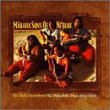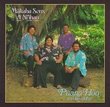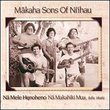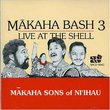Showcase
JC | MD USA | 03/16/2008
(5 out of 5 stars)
"As the other reviewer noted the recording is not ultra-professional, though soundboard and clean. It's vocal heavy but the vocals really shine, and are a big part of what they were about. The rest is there, though the balance is a little off (it seems to be the straight house mix rather than a separate remix for the recording - if this was then intended to be released a good engineer would have ran an independent mix that could later be remixed, but I'm sure a multi-track recording was beyond their means, as back then that was some heavy duty equipment).
Nevertheless I actually like this one a bit better than some of their studio stuff. I tend to favor live recordings anyway as a true measure of what a group is about. They tend to capture a little more inspiration (if it's there) or point out what's lacking (if it's not). There's a little bit of showiness in the stage patter, but the vocal harmonies are truly sweet."
Live At Hank's Place
Pacific Shores | Oceanside, Oregon USA | 03/25/2008
(5 out of 5 stars)
"Hank's Place, that was the setting for this recording, was a modest local hangout in Kaimuki with a minimal stage set up. Electronic technology has come a long way in the past 30 years! So, When you really think about it, the world is just so lucky to have a recording that is so good!
A previous review mentions that the album reflects racial/cultural issues still alive in Hawaii. We don't know of any translation for the word (haoli)! We think what the reviewer is referencing is the word HAOLE that is sung about in the Lai Toodle song.
Haole, (pronounced: How-leh) in the Hawaiian language, means "foreign" or "foreigner"; it can be used in reference to people, plants, and animals. The origins of the word predate the 1778 arrival of Captain James Cook.
Haole, in its current definition, first became associated with the children of Caucasian (white) immigrants in the early 1820s. It unified the self-identity of these Hawai'i-born children whose parents were as much culturally different as they were similar. Today haole is really just another way of saying white. Yep, I'm a haole, too!
As with any word, Haole can be used as a racially derogatory word and can be used descriptively or derisively.
The Lai Toodle song is thought to have been written and sung by plantation workers in the sugar cane fields. In short it speaks of a big "haole" overseer who rides on a big white horse and kicks the workers (Filipino, Japanse, Chinese, and etc.) too much as they carry cane in the fields. This song really is a very enjoyable easy listening song!"


 Track Listings (12) - Disc #1
Track Listings (12) - Disc #1



